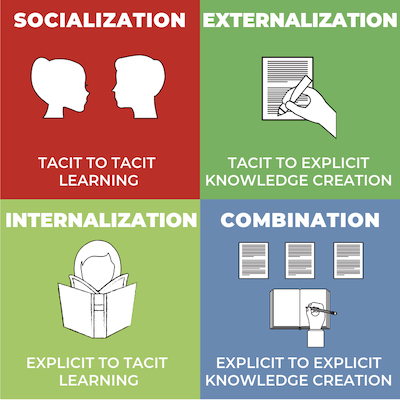
Etienne Wenger and William Snyder claim that “although communities of practice have been around for centuries” the use of “the term [is more] recent”. Wenger and Snyder go on to note how craftsmen gathered in ancient Greece for social, business, and educational reasons, and guilds in the Middle Ages gathered for similar purposes. Our question for you is, how might communities of practice (CoP) be instrumental in making design useful to you, and more broadly, in helping your school become a learning organization?
Characteristics
CoP have been envisioned as requiring three primary characteristics that may not be true of other kinds of groups like teams, clubs, or networks. These three characteristics are a common domain, an interactive community, and a shared practice.
A Common Domain: According to the Canadian communityofpractice website, CoP “have a shared domain of interest, competence and commitment that distiguishes them from other [groups].” The domain reflects an area of professional interest that becomes a source of learning and growth for its members.
An Interactive Community: CoP are groups that regularly seek to engage with one another around shared activities, knowledge, and strategies of practice within a common domain. They are relationally focused groups that connect in order to discuss, support and learn from each other.
A Shared Practice: CoP do not simply meet to share or interact with each around an area of interest, but rather around a domain in which participants are actual practitioners. This sharing of ideas and resources thus helps to cultivate tacit knowledge within community members so that they are able to implement new methods and techniques within a particular domain.
Authentic Learning
 So, how might you encourage the development of CoP in your educational context? And what might be the benefits of doing so? Connecting CoP with the SECI model of organizational learning, we recognize that CoP can engender all four knowledge creation processes. Although CoP are most often envisioned as socialization processes, CoP can also generate explict knowledge as a summary step in certain tacit exchanges (the process of externalization). In addition, CoP can leverage formal training times to generate new tacit knowledge from expert explicit knowledge (the process of internalization). We see the following three overarching purposes as significant reasons why CoP reflect strategic priorities for organizational learning and professional growth:
So, how might you encourage the development of CoP in your educational context? And what might be the benefits of doing so? Connecting CoP with the SECI model of organizational learning, we recognize that CoP can engender all four knowledge creation processes. Although CoP are most often envisioned as socialization processes, CoP can also generate explict knowledge as a summary step in certain tacit exchanges (the process of externalization). In addition, CoP can leverage formal training times to generate new tacit knowledge from expert explicit knowledge (the process of internalization). We see the following three overarching purposes as significant reasons why CoP reflect strategic priorities for organizational learning and professional growth:
Mutual Trust and Open Dialogue: A common set of struggles in any organization surrounds our human fallibilities and brokenness. This dark side or shadow side reality in organizational life can lead to counterproductive problems like selfish ambition, conflict, isolation, and distrust. CoP offer a learning space where trust can be cultivated through open dialogue. CoP can generate redemptive thinking and synergistic relationships when such a vision is established for why CoP exist.
Shared Participation and Reflective Practice: Horizon would encourage you to envision the development of CoP for the purpose of allowing relationships to encourage collaborative growth among its particpants. Simply coming together as fellow practitioners can generate conversations that result in learning and growth. These purposes can be even further amplified when CoP encourage a mindset of reflective practice, that is, of participants examining personal assumptions related to practice and making them explicit for the benefit of the CoP.
Cultivating Culture: CoP also offer a fruitful space for cultivating a culture of learning and growth across an organization. This happens when its members engage in mutual sharing of ideas and experiences through regular dialogue. CoP also can help generate a spirit of experimentation, where members are able to explore new ideas safely and report back to the community what happened whether the experiment seemed a success or a failure. In these ways, CoP begin to develop a share language of personal growth, professional learning, and best practice.
[1] E. Wenger & W. Snyder, "Communities of Practice: The Organziational Frontier, "Harvard Business Review. January-February, 2000, p. 140. Accessed on November 10, 2020 at http://www.psycholosphere.com/Communities%20of%20Practice%20‑%20the%20 organizational%20frontier%20by%20Wenger.pdf
